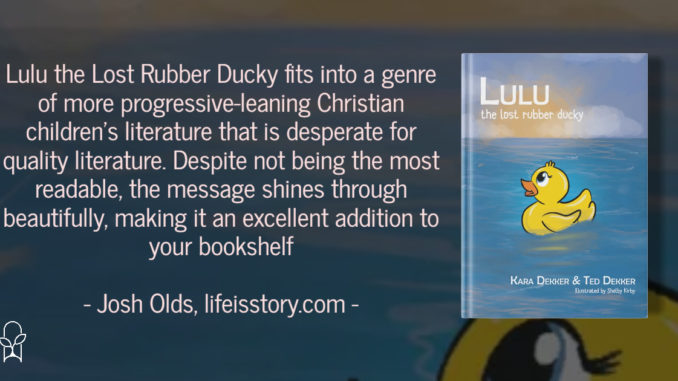
Also by this author: The Dream Traveler's Quest, Into the Book of Light, The Curse of Shadownman, The Garden and the Serpent, The Final Judgment, Monty and the Tree of Light, Barton the Dream Jumper, The Promise, The Drummer Boy, Sinner, Green, Millie Maven and the Bronze Medallion
Series: Dekker Picture Books #1
Published by Scripturo on August 18, 2022
Genres: Children's

Lulu is a rubber ducky on her way to America when the cargo ship she and her family are on capsizes. Separated from the others on the vast ocean, she will discover her courage as she finds the others lost at sea and leads them all to a beautiful island paradise.
The latest Ted Dekker series is here! And it’s not a serial killer novel or an epic fantasy. This time, Ted has paired with his daughter, Kara Dekker, and illustrator Shelby Kirby to create a children’s picture book trilogy that explores themes like identity, belonging, love, and faith. Lulu The Lost Rubber Ducky is the story of a rubber ducky lost at sea, separated from the rest of its family who also tipped overboard while on a cargo ship. Her family is lost, but she’s lost and alone. The journey to find her family won’t be easy, but Lulu’s courage, perseverance, and kindness—along with unexpected help—guides her back to safety.
At first, I was worried this story was going to be a little too similar to the Eric Carle classic 10 Little Rubber Ducks, also about lost little rubber ducks who fall off a container ship in a storm. Fortunately, the story soon pivots toward being its own thing, making this a clever homage to Carle and a story that most people who read children’s books are going to pick up on. Lulu is separated from her family and, in her attempts to find her way back, shows kindness to everyone she meets.
When hope seems lost, a golden butterfly called the Helper appears to guide Lulu back to her family. Only one problem…her family is lost, too! Following the Helper, Lulu then leads her family to a new home made especially for lost little duckies. The whole story is beautiful, age-appropriate metaphor for following Jesus, even though the Dekkers never make that overt or smash you over the head with the message. (Indeed, I’ve seen some more overt explanation of symbolism in some of Dekker’s fiction meant for adults!). It’s perfectly introspective for young readers, clear enough that they get the message, but veiled enough that parents can turn it into a conversation.
Shelby Kirby’s illustrations are eye-catching and fun. She captures the darkness of the storm and contrasts it well with the yellow of the ducky. The final panel (I won’t spoil it) is an absolute delight of color and cacophony. It’s simple, without being simplistic, doesn’t try to do too much, and is perfect for a younger audience.
While the story is excellent and the illustrations superb, the actual text of the story could have used another round of proofreading and should have used simpler sentences. The opening line of Lulu the Lost Rubber Ducky is a great example. It reads: “Once upon a time there was a small rubber yellow ducky named Lulu who was sailing across the ocean in a large container on a boat.”
First, I tend to over-use commas, but typically one should see a comma off-setting the opening phrase “Once upon a time.” Especially when stories are read aloud—as children’s books often are—comma placement helps readers know when to pause in the story and build a storytelling cadence. Second, commas should separate consecutive coordinate adjectives. The line should be “small, rubber, yellow ducky.”
And if that phrase still sounds off to you, it’s because, third, it also violates the rule about adjective order. Adjectives should be ranked by opinion, size, age, shape, color, origin, material, then purpose. Thus “small, yellow, rubber ducky” is the grammatically appropriate phrase. Fourth, there are a lot of long sentences in Lulu the Lost Rubber Ducky that could easily have been two (or even three!) sentences. This not only helps with pacing when reading aloud but helps young readers navigate the text on their own. The text on the first panel scores a D on readable.com, a website that evaluates the readability of documents and other texts. It has a Flesch reading ease of 55.2, which is described as a 10th-12th grade reading level. This all might seem picky and technical, but one of the most important parts of children’s books, especially books aimed at children learning to read is that they are easily readable. That’s the flaw in Lulu the Lost Rubber Ducky, the only negative mark I have, but not an insignificant one.
Lulu the Lost Rubber Ducky fits into a genre of more progressive-leaning Christian children’s literature that is desperate for quality literature. Despite not being the most readable, the message shines through beautifully, making it an excellent addition to your bookshelf, right alongside the other two books in this series.
